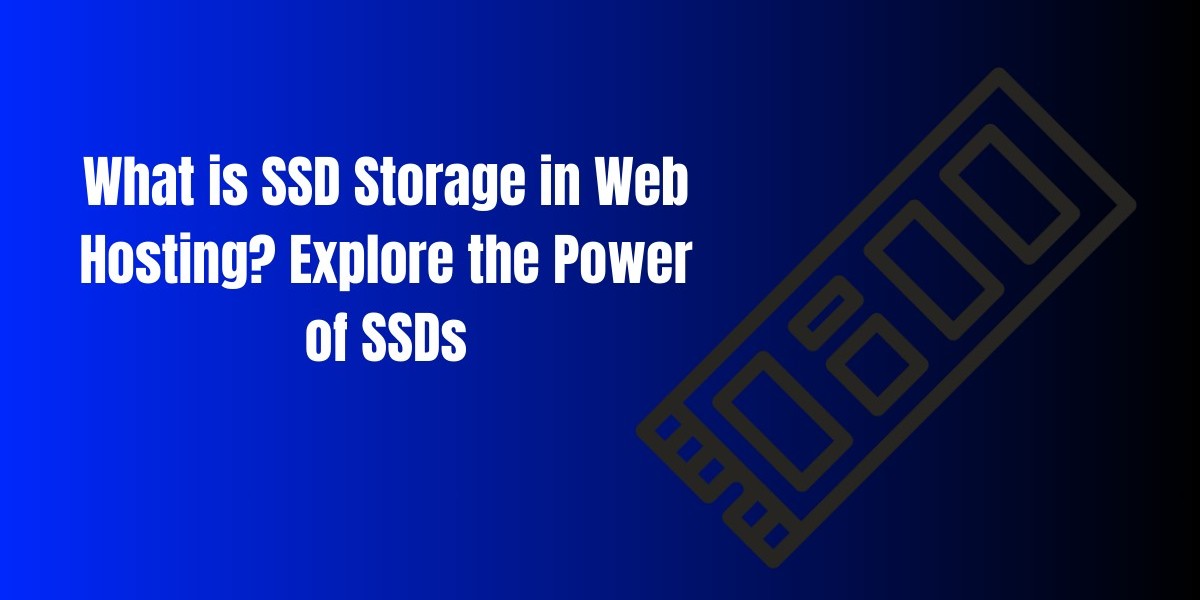When it comes to web hosting, speed and performance are everything. One of the most significant advancements in hosting technology has been the adoption of SSD storage. But what exactly is SSD storage in web hosting, and why does it matter for your website? In this guide, we’ll explore the power of SSDs and why they’re a game-changer for web hosting.
What is SSD Storage?
SSD stands for Solid State Drive. Unlike traditional Hard Disk Drives (HDDs), which use spinning magnetic disks and mechanical read/write heads, SSDs use flash memory to store data. This means there are no moving parts, resulting in significantly faster data access, improved reliability, and better overall performance.
How SSDs Work in Web Hosting
In web hosting, SSDs store all your website’s files, databases, and applications. When a visitor requests your site, the server retrieves this data from the storage drive and delivers it to their browser. With SSDs, this process happens almost instantly, thanks to their lightning fast read and write speeds.
What are the Advantages of SSD Storage in Web Hosting?
The benefits of SSDs extend far beyond just speed. Here’s why SSDs are the preferred choice for modern web hosting:
Lightning-Fast Load Times
SSDs can read and write data much faster than HDDs. This means your website will load quicker, providing a smoother experience for your visitors. Since page speed is a critical factor for user engagement and SEO, SSDs give you a competitive edge.
Improved Reliability and Durability
With no moving parts, SSDs are less prone to mechanical failure. They’re also more resistant to physical shock, temperature fluctuations, and wear and tear. This makes them ideal for ensuring uptime and data integrity.
Enhanced Performance for Databases and Applications
Websites relying on databases (e.g., e-commerce stores, membership sites) benefit tremendously from SSDs. Database queries execute faster, leading to quicker page renders and smoother functionality for dynamic content.
Lower Power Consumption
SSDs are more energy efficient than HDDs, which is better for the environment and can reduce operational costs for hosting providers.
Quicker Backup and Restoration
With faster data transfer rates, backups and restorations are completed more quickly, minimizing downtime in case of emergencies.
What are the Differences Between SSDs and HDDs?
| Feature | SSD (Solid State Drive) | HDD (Hard Disk Drive) |
|---|---|---|
| Speed | Extremely fast read/write speeds | Slower due to mechanical parts |
| Durability | No moving parts; highly durable | Prone to failure due to moving parts |
| Power Use | Energy-efficient | Consumes more power |
| Noise | Silent operation | Audible clicks and spins |
| Cost | Higher cost per GB | More affordable for large storage capacities |
| Ideal Use | Operating systems, databases, applications | Archival storage, large files |
Who Needs SSD Storage?
While SSDs benefit nearly every type of website, they’re particularly important for:
E-commerce sites: Faster load times reduce cart abandonment.
High-traffic blogs and news sites: Quick page loads keep readers engaged.
Database-driven websites: Faster query processing improves performance.
Websites using WordPress or other CMS platforms: SSDs handle numerous simultaneous requests efficiently.
For those seeking hosting solutions that leverage SSD power, Hosting Mastery Hub offers insights and recommendations to help you make the right choice.
What Should You Look for in an SSD Hosting Plan?
When choosing an SSD hosting plan, consider the following:
Storage Capacity: Ensure the plan offers enough SSD storage for your needs.
Type of SSD: NVMe SSDs are even faster than SATA SSDs look for them if speed is critical.
Caching Technology: Some hosts use SSDs for caching while storing data on HDDs. Opt for full SSD storage for the best performance.
Uptime Guarantees: Choose a provider with a strong uptime guarantee backed by SSD reliability.
FAQs About SSD Storage in Web Hosting
1. Is SSD hosting more expensive?
While SSD plans may cost slightly more than HDD based plans, the performance benefits far outweigh the minimal price difference.
2. Can I upgrade to SSD storage later?
Most hosting providers allow you to upgrade your plan to include SSD storage as your website grows.
3. Do SSDs improve SEO?
Indirectly, yes. Google considers page speed a ranking factor, and SSDs significantly boost loading times.
4. Are SSDs used in all types of hosting?
Yes, SSDs are available in shared, VPS, dedicated, and cloud hosting environments.
5. How long do SSDs last?
Modern SSDs have long lifespans and are designed to handle years of read/write cycles.
6. What is NVMe SSD?
NVMe (Non-Volatile Memory Express) is a protocol designed specifically for SSDs, offering even faster speeds than SATA SSDs.
7. Can SSDs fail?
While more reliable than HDDs, SSDs can still fail due to electronic issues, though it’s less common.
8. Where can I find SSD hosting recommendations?
HostingMasteryHub provides curated lists of top SSD hosting providers to help you choose the best option for your needs.
Conclusion
SSD storage is no longer a luxury it’s a necessity for anyone serious about their website’s performance, security, and user experience. By opting for SSD hosting, you’re investing in faster load times, better reliability, and a foundation that can scale with your growth.
For expert advice and tailored recommendations on the best SSD hosting solutions, be sure to check out Hosting Mastery Hub.






